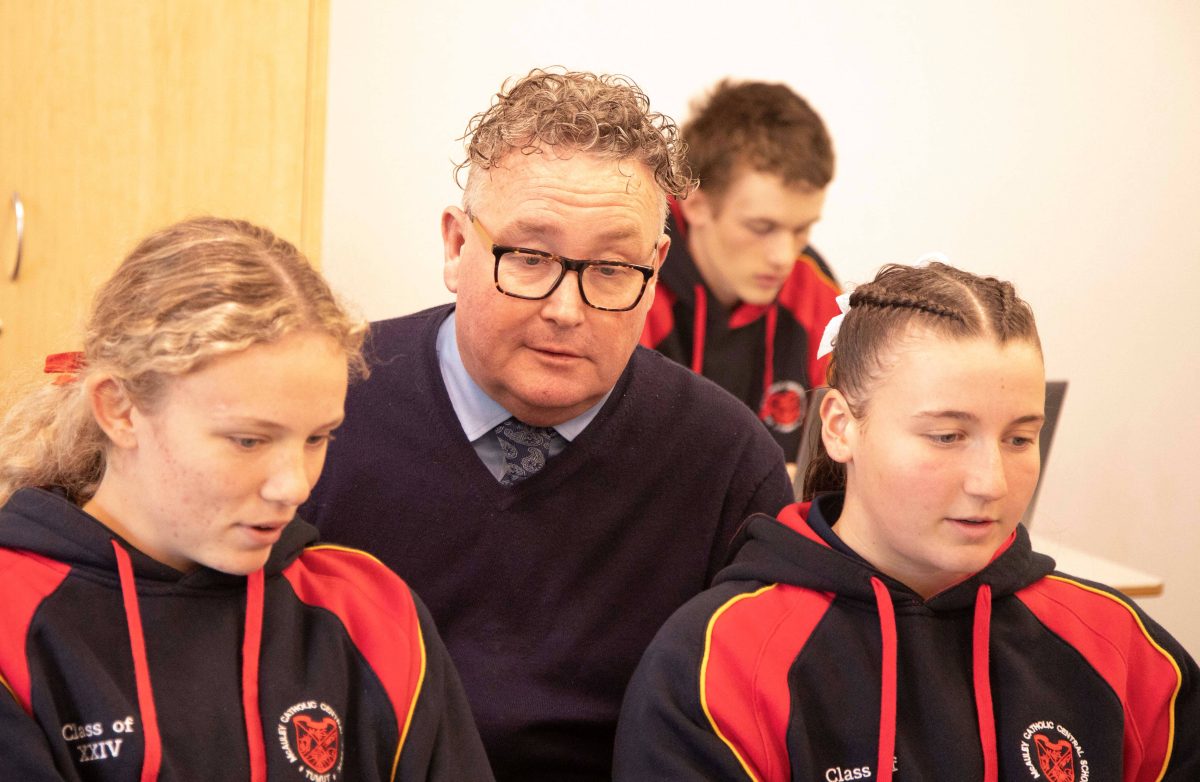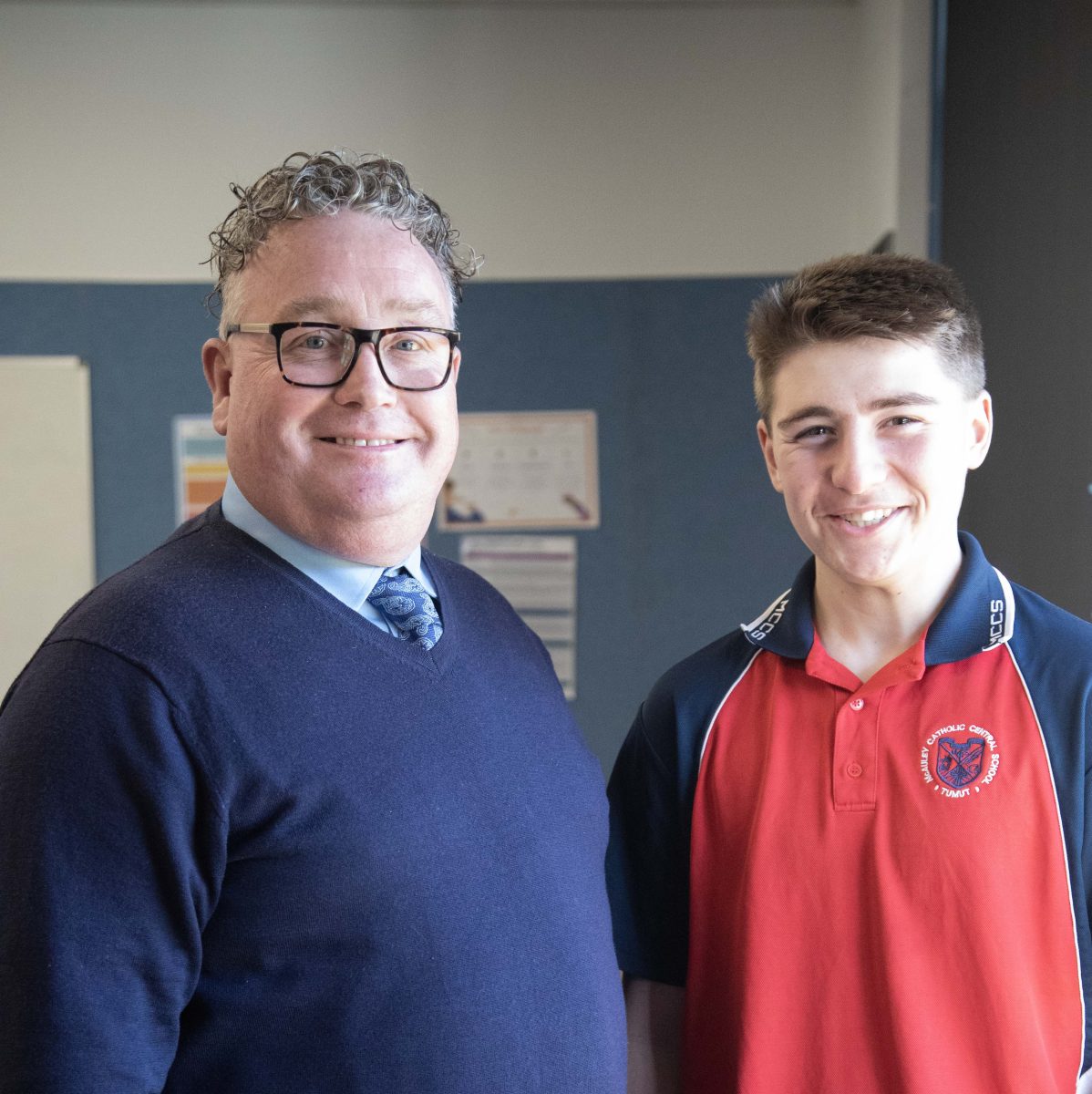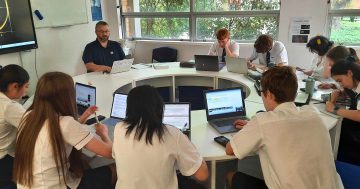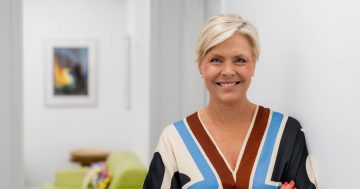
Tumut school principal Eamonn Moore is one of about 4500 fellowship recipients awarded in the Churchill Trust’s 58-year history. Photos: Eamonn Moore.
School doors may have closed during COVID-19, but a Tumut principal saw that challenge as an opportunity and has led students at McAuley Catholic Central School to virtually bust down any barriers to comprehensive regional and rural education.
And as the 2023 school year draws to a close, that principal, Eamonn Moore, is shoring up an itinerary brimming with visits to a range of cutting-edge United States educational institutions as his investigation of virtual learning best practice and innovation goes global.
This is thanks to one of Australia’s most prestigious fellowships from the Winston Churchill Trust – The Blakeney Millar Foundation Churchill Fellowship – recently conferred on Mr Moore, an educator for 40 years.
The Winston Churchill Memorial Trust was established in 1965 following the death of former UK prime minister Sir Winston Churchill.
It was formed with the chief objective of perpetuating and honouring Sir Winston’s memory by awarding memorial fellowships, to be known as Churchill Fellowships, offering Australian citizens and permanent residents a life-changing opportunity to travel overseas for four to eight weeks to learn more about a topic or issue they’re passionate about.
Mr Moore is one of about 4500 recipients awarded in the trust’s 58-year history.
“It’s very humbling, and it’s equally exciting and daunting,” he recently told Region Media, “but to be able to project forward and realise how much expert knowledge and practice I can bring back to really, really make what we’re doing fantastic is thrilling.”
An accomplished educator with broad experience in NSW and ACT schools, including his own time as a student at a rural central school, Mr Moore is passionate about providing the best opportunities for the students at McAuley Catholic Central School and beyond.
His career as an educational leader began with his own academic pursuits, earning a master’s degree in education technology whereby he developed a comprehensive understanding of the impact technology has on learning outcomes.
Coupled with a passion for rural schools, he says his mission has always been to create positive change and enhance the opportunities available to country students.
“I’ve always been interested in the future of education and in being able to offer rural kids a wider choice of subjects,” Mr Moore said.
As part of the Archdiocese of Canberra and Goulburn, McAuley’s rich history of educating boys and girls from the Tumut area harks back to 1882 when the Mercy Sisters established the school as St Brigid’s Girls School.
At what was traditionally a K-10 campus, Mr Moore has recently overseen the introduction of years 11 and 12 at McAuley, allowing students to complete their primary and secondary education at the school.
The COVID pandemic – when classrooms closed and teachers and students were forced onto computers to press ahead with their learning – twinkled the first glimmer of possibilities for Mr Moore.

“It gives students the opportunity to stay at home with their families in Tumut,” 2023 Churchill Fellow, Tumut school principal Eamonn Moore, says of virtual education.
“I guess I came to a realisation that even though the kids are at home in their houses and the teachers are teaching from their houses, the school can still run and it made me start to wonder and to research what other people were doing, well, all of a sudden, you don’t really need 25 kids in a room and a teacher standing at the front,” he said.
Working with other like-minded rural schools, such as St Anne’s at Temora and Trinity Catholic College in Goulburn, Mr Moore assembled an expert team of teachers and worked with Catholic Education specialists to upskill staff and create innovative resources and learning tools to create virtual learning modules.
“So, the teacher runs a team lesson once a week with a group of kids online, and then the teacher is available for questions and for marking and check-ins throughout the week,” he explained.
He says the use of virtual learning has opened a new and exciting pathway to allow learners to access subjects and teachers without having to leave home and go away to study, even at a tertiary level.
Like McAuley’s first year 11 class, which, in 2024, will graduate in a range of subjects not previously on offer, such as biology and business studies.
“It gives students the opportunity to stay at home with their families in Tumut, to play footy or netball for local teams, to have a job in town, to be at their school, with their friends, and to have availability of subjects they wouldn’t have been previously able to access,” Mr Moore said.
He said COVID had given rise to anxiety, school refusal and students uncomfortable being at school, “so we’re also offering options to them where they can study at home without having to face a big busy school”.
Prospects, too, for teachers, retired or remote, as schools amid a teacher shortage can share resources across multiple schools and campuses.
“Those people who are at the end of their careers, who don’t want to be doing playground duty or dealing with roomfuls of kids in a classroom, can now teach in a different environment,” he said.
In visiting the US schools, Mr Moore aims to discover international best practice and utilise those connections and that information to enhance the virtual learning path for all country students.
“Over there they have fully virtual school campuses, some with up to 1000 students, kindergarten to year 12, so for me to go over and see leading practice, best practice will only provide greater opportunities for our country kids,” he said.
“It also allows senior students exposure to a dynamic and engaging educational environment that prepares them for the challenges of the digital age.”
Mr Moore believes learning and teaching through virtual learning has the potential to open the world to country students.
“Breaking down barriers of geography and teacher expertise opens endless and exciting opportunities to learn and interact with experts in locations and specialisations previously rarely [if ever)] available to our students,” he said.
“It is anticipated that this project will enrich the future development of this program not only for our students but for all in rural NSW Catholic schools.”









